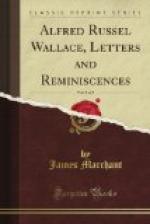CHA. LYELL.
* * * * *
TO SIR C. LYELL
1867.
Dear Sir Charles,—Why the colour of man is sometimes constant over large areas while in other cases it varies, we cannot certainly tell; but we may well suppose it to be due to its being more or less correlated with constitutional characters favourable to life. By far the most common colour of man is a warm brown, not very different from that of the American Indian. White and black are alike deviations from this, and are probably correlated with mental and physical peculiarities which have been favourable to the increase and maintenance of the particular race. I shall infer, therefore, that the brown or red was the original colour of man, and that it maintains itself throughout all climates in America because accidental deviations from it have not been accompanied by any useful constitutional peculiarities. It is Bates’s opinion that the Indians are recent immigrants into the tropical plains of South America, and are not yet fully acclimatised.—Yours faithfully,
A.R. WALLACE.
* * * * *
SIR C. LYELL TO A.R. WALLACE
73 Harley Street. March 13, 1869.
Dear Wallace,— ...I am reading your new book,[10] of which you kindly sent me a copy, with very great pleasure. Nothing equal to it has come out since Darwin’s “Voyage of the Beagle.” ... The history of the Mias is very well done. I am not yet through the first volume, but my wife is deep in the second and much taken with it. It is so rare to be able to depend on the scientific knowledge and accuracy of those who have so much of the wonderful to relate....—Believe me ever most truly yours,
CHA. LYELL.
* * * * *
CANON KINGSLEY TO A.R. WALLACE
Eversley Rectory, Winchfield. May 5, 1869.
My dear Sir,—I am reading—or rather have all but read—your new book,[10] with a delight which I cannot find words to express save those which are commonplace superlatives. Let me felicitate you on having, at last, added to the knowledge of our planet a chapter which has not its equal (as far as I can recollect) since our friend Darwin’s “Voyage of the Beagle.” Let me, too, compliment you on the modesty and generosity which you have shown, in dedicating your book to Darwin, and speaking of him and his work as you have done. Would that a like unselfish chivalry were more common—I do not say amongst scientific men, for they have it in great abundance, but—in the rest of the community.




